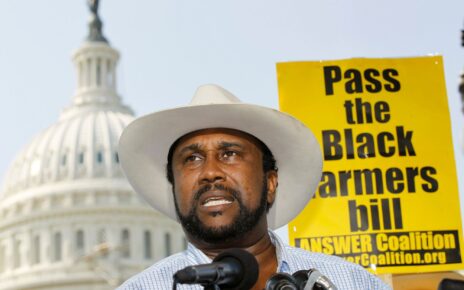Documentaries about American politics
This week’s question: What is the best documentary about the American political system?
“13th”
Anne McCarthy (@annemitchmcc), Teen Vogue, Ms. Magazine, Bonjour Paris
Although “13th” is, in effect – at face value – about the U.S. prison system, that’s not entirely what it’s about. Ava DuVernay’s Oscar-nominated 2016 documentary illustrates with poise and punch just how the U.S. political system and the government directly contributed to the highly problematic American prison system as we know it today. From President Clinton’s “3 Strikes” rule, President Reagan’s crack-down on crack cocaine, and more, we see the correlations between political acts and overcrowded jails, wrongly convicted inmates, and young lives lost at the hands of the people who are supposed to protect them. In an ideal world, every American would see this film.
Don Shanahan (@casablancadon), Every Movie Has a Lesson and Medium.com
Titled after and rooted in the impact of the Thirteenth Amendment to the Constitution of the United States, Ava DuVernay’s “13th” impresses me to no end. The documentary, through its many layers of examination, targets the highly questionable politics that have guided and crafted the unfair and unrighteous challenges faced by African-Americans since the end of the Civil War. DuVernay’s guidance, paired with editor Spencer Averick, through the century-plus years of racist and suppressive legislative measures is comprehensive and powerful.
The film’s eye-opening engagement of these mistakes makes the resulting and well-presented situations and settings of disenfranchisement, segregation, demonization, and incarceration from those measures even more startling.
“American Experience: Nixon”
Robert Daniels (@812filmreviews), 812filmreviews, ThatShelf, Freelance
I’ve always thought bad government was the “best” way to learn about good government. No better example exists than Nixon of bad and good government, and PBS’ “American Experience: Nixon” is a must watch for any presidential historian or aficionado. The two-part documentary runs for 167 minutes and follows the disgraced president from his humble beginnings to his ultimate downfall during Watergate and beyond. His presidency seems all too prescient to our political climate, and is a reminder that even until the final days of Watergate he retained significant and broad support. His final speech to his staffers and family—where one can hear audible sniffling and crying—is a time capsule that was never fully sealed by that generation or ours. Indeed, Nixon might be the first noteworthy example of loyalty to party over country. Wonderfully engrossing—with a fascination toward Nixon’s psychology—the documentary is a road map to the traits and signs of a great president or to a complete and utter disaster.
“Dark Money”
Daniel Joyaux (@thirdmanmovies), freelance contributor for Vanity Fair, The Verge, MovieMaker Magazine, Filmotomy
Most documentaries about American politics (especially those that take a macro approach) tend to run into two specific problems: the starting point of the issue(s) is painfully blurred or nonexistent, and/or the resultant problems are shown to dramatically affect the entire country (rather than specific people and communities). But just last year, a brilliant film called “Dark Money” managed to avoid both of these stumbling blocks.
When the 2010 Citizens United Supreme Court ruling overturned an existing Montana law blocking dark money from the state’s politics, Montana elections–and who ran in them–dramatically changed overnight. In this tight, expertly researched film, director Kimberly Reed keeps the focus on the consequences this ruling had on Montana communities, driving home the ways Washington politics negatively impact people’s actual lives. There are documentaries that more fully capture *what* has been happening to America under the modern Republican party, but I haven’t seen one that does a better job of tracing our modern realities into painfully precise Hows and Whys.
“The Fog of War”
Luke Hicks (@lou_kicks), Film School Rejects/One Perfect Shot, Birth.Movies.Death.
Rarely is the curtain lifted for us by the very hands that once pulled it down over our eyes in the first place. “The Fog of War: Eleven Lessons from the Life of Robert S. McNamara” is easily among the most profound documentary experiences I’ve ever had and by far the foremost political documentary experience. Such is the nature of Errol Morris’s ability to carefully excavate his subjects. The controversial and accusedly calloused Secretary of Defense under JFK and LBJ, McNamara reflects candidly on the consequences of the decisions he and his elite cohort of political and military powers made to keep shoveling coal into the fire that was America’s perfidious involvement in Vietnam in the ’60s.
The enlightening insider perspective on conversations behind closed doors, real reasons why the American military industrial complex refused to back out of Vietnam, and America’s ruthless military strategy in past wars exists in a vacuum of transparency that otherwise repels politicians and top tier world decision-makers. That’s why ‘The Fog of War’ is so singular, so shocking. It not only ushered the horrific tragedy of Vietnam back into the cultural spotlight of mass collective memory, but it actually gave us answers to long-silenced questions. And those answers will drastically change the way you think about modern warfare, governing military personnel, and the histories behind both. For once, the hunt for truth wasn’t in vain.
“Journeys with George”
Christopher Llewellyn Reed (@chrisreedfilm), Hammer to Nail, Film Festival Today
Though I am tempted to choose documentaries like Ava DuVernay’s brilliant “13th“ or Raoul Peck’s equally insightful “I Am Not Your Negro,” both of which delve into the racist underpinnings of our political system, I am going, instead, with Alexandra Pelosi’s 2002 “Journeys with George.” A profile of our 43rd president during the 2000 campaign, the film perfectly encapsulates the gross superficiality of how we select our officials. George W. Bush comes across as a genuinely likeable guy (and I loathe the man, his policies, and his terms in office), demonstrating once and for all that no matter how awful a human being you may be in real life, if you project affability, you’ve got it made. And even though a journalist, Pelosi (Nancy’s daughter), despite professed progressive beliefs, falls under W’s spell, as well. So much for the so-called liberal media. And that’s all we really need to know about American politics.
“Medium Cool”
Clint Worthington (@clintworthing), Consequence of Sound, The Spool
While your “War Room”s and “Weiner”s are wonderful modern political docs, I have to give it up to the grandpappy of them all: the scintillating 1969 semi-doc “Medium Cool”. Haskell Wexler, a documentarian by trade, morphed the 1968 Democratic National Convention in Chicago into a simmering political potboiler, blending real footage of the DNC and the ensuing anti-war protests with a narrative story told from the perspective of a cynical news cameraman (Robert Forster). More than a rote account of the events at the DNC, “Medium Cool” is a beautiful exploration of Vietnam-era American sentiment and the ethics of journalism – are journalists supposed to be dispassionate observers, or active participants in justice? When a man is getting beaten by the police, are they just supposed to film it, or intervene? It’s a question Wexler and the filmmakers undoubtedly asked themselves during production, much of the film’s harrowing climax culled from real-life footage Wexler filmed during the violent police crackdowns.
Is it a documentary? Is it a narrative film? “Medium Cool” rests in a gripping liminal state between both. It’s a story about a fictional man swimming in the tensions of the counterculture and America’s changing views about itself. At one point, a smoke bomb is thrown at the camera; offscreen, someone shouts, “Look out Haskell, it’s real!” Hearing the director’s name suddenly shouted at you is a big shock to the system; we’re reminded that there’s a man there, with a camera, dodging smoke bombs hurled from vindictive police during one of the most tumultuous times in American history. While “Medium Cool” might have some of the trappings of a narrative film, its ability to morph between fiction and non-fiction has rarely been done with such panache and political import.
“Primary”
Richard Brody (@tnyfrontrow), The New Yorker
Properly viewed, the American political system is seen in many nonelectoral places, whether courtrooms and prisons and law offices (“The Chair”) or schools and streets (“The Children Were Watching,” “Crisis,” “Welfare”), but modern documentary filmmaking was born with an expressly electoral film, Robert Drew’s “Primary”: the founding work of direct cinema reveals founding scenes of modern media politics.
“The War Room”
Christopher Campbell (@thefilmcynic), Nonfics, Film School Rejects
I’m going with two documentaries, because they’re by the same two people and make for a perfect double feature. The first is, of course, the classic 1993 film “The War Room,” D.A. Pennebaker and Chris Hegedus’s Oscar-nominated peek behind the scenes of Bill Clinton’s bid for the White House in 1992. The film presents a then-new kind of campaign and makes stars out of the strategists who ran it, most notably James Carville and George Stephanopolous. Follow that up with the 2006 film “Al Franken: God Spoke,” directed by Hegedus and Nick Doob with Pennebaker producing. Although focused on future (disgraced) senator Al Franken at a time when he wasn’t running for office, just touring as a commentator, his status as a political humorist represents how interested the left was in comedic influencers during mid-aughts (think also of Michael Moore, The Daily Show and even Will Ferrell). Even if unintended as such, “God Spoke” gets to the big picture of where the Democratic Party was, for worse this time, as “The War Room” does for its era. I wish the filmmakers would go for a third documentary since the American political system keeps on changing. If you need something more focused on the actual politicians, check out Aj Schnack’s “Caucus.”
Ethan Warren (@EthanRAWarren), Bright Wall/Dark Room
I took this prompt as an excuse to rewatch “The War Room,” D.A. Pennebaker and Chris Hegedus’ observational documentary on Bill Clinton’s 1992 presidential campaign, and I was astonished all over again by how miraculous this movie is. It’s a documentary that feels like narrative drama thanks to Pennebaker’s talent for arranging and juxtaposing immersive camera work and archival footage to craft perfectly orchestrated dramatic effects out of the messy chaos of real life without ever explicitly tipping his hand (it’s a testament to Pennebaker’s power as a storyteller that the Documentary Now! parodies of his films are often just barely heightened).
Much has been made of the too-good-to-be-true central pairing of campaign strategists George Stephanopoulos and James Carville, a duo as improbable as they are indelible, and of the stranger-than-fiction love story playing out around the margins between Carville and his ostensible nemesis, Bush operative Mary Matalin (the two would marry the following year and have been together ever since). Yet for as undeniably entertaining as the film is, that effervescence doubles as a quiet provocation for the viewer. Through every one of the film’s 96 riveting minutes, we’re reminded how easy it is to get drawn into the soap opera dramatics of an election, treating as sport something that is ultimately a life and death issue with epoch-spanning repercussions. There are cavalier choices made by Carville and Stephanopoulos that play in the moment as “Whatever it takes” compromises but are now recognizable as a slight shifting of the standards of fair play that would echo and amplify across the coming decades—when Stephanopoulos and Carville gleefully construct and disseminate a political narrative, it’s not hard to make the short walk to the fake news epidemic of 2016.
On some level, “The War Room” functions as a sort of “The Phantom Menace” to our current “The Empire Strikes Back,” a self-contained drama with many of our current protagonists milling about in the background (after the past few days, it’s particularly jarring to see Chelsea Clinton as a gawky preteen). Even divorced from any current context, though, this is the rare documentary that serves as simultaneously a vital historical text, a ruthlessly assembled work of nonfiction, and a damn good cinematic yarn.
“Weiner”
Mike McGranaghan (@AisleSeat), The Aisle Seat, Screen Rant
I’ve never been as transfixed by a political documentary as I was by “Weiner.” Former Congressman Anthony Weiner allowed a camera crew to follow him as he attempted to re-enter politics after tweeting out a picture of his anatomy (one his last name provides a euphemism for) to what he erroneously thought was one follower. During the making of the doc, he creates a scandal again, sending sexually explicit photos to a 22-year-old woman. His embarrassed wife Huma Abedin gets swept up in the whirlwind.
“Weiner” shows you what a great big political scandal looks like from the inside. It shows how the people involved on all levels are affected, while also examining the self-serving mindset that makes politicians try to keep moving forward even when their darkest flaws have been made public. The film is more timely now than ever before.



















